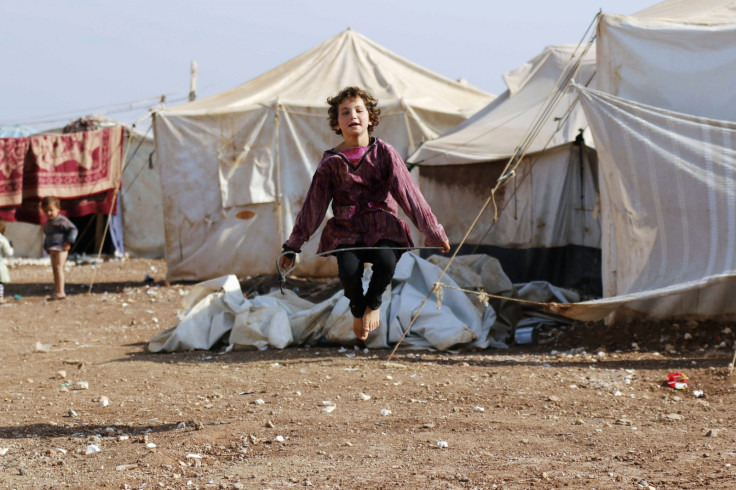Syria: Why has UK's David Cameron turned his back on refugee mega-crisis?

While the world follows news of Islamic State (Isis) atrocities in Syria, with mass executions and bloody battles making headlines, the refugee situation facing the Syrian people is said to be reaching a "dangerous turning point".
Syrians have become the largest refugee population after Palestinians, as at least three million people have fled the country since the beginning of the civil war in 2011. It is estimated that 6.5 million Syrians are internally displaced and of these, half are children.
The United Nations high commissioner for refugees, Antonio Guterres, addressed the Security Council, highlighting the urgency in tackling the issue.
"The Syrian refugee crisis has overwhelmed the existing response capacities, with 3.8 million registered refugees in neighbouring countries," he said.
Amnesty International has revealed that only five countries host 98% of all Syrian refugees; Iraq, Lebanon, Turkey, Jordan and Egypt, while in the EU the number of refugees is only 150,000.
These host countries are severely overstretched; the populations of Lebanon and Jordan have seen their populations grow in just a few years to the point they expected to reach in several decades.
With Syrians finding it increasingly difficult to reach safety, Guterres said that more and more refugees are taking the dangerous journey across the Mediterranean into Europe, with over 370 people drowning at sea since the start of 2015.
"The UK government has only settled 143 Syrian refugees, which is simply not good enough"
European countries have been blamed for not doing enough to assist refugees attempting the perilous crossing. The decision to end Italy's Mare Nostrum search and rescue coastguard operation has been heavily criticised, and doubts cast over the ability of the smaller EU Triton patrol mission to handle the influx of stricken migrants.
Guterres urged the 15 member states of the UN Security Council to step up support for refugees and host countries, citing the examples of Germany and Sweden who have been commended for offering legal access with more opportunities to refugees.
As well as humanitarian aid, he stressed the need for visa policies, academic sponsorship and private sponsor schemes. "One-tenth of the Syrian refugees would require resettlement as the adequate solution for their protection situation," he said.
The UK is one of the countries that has been singled out for its slow response to the UN's call for joining the international programme of resettling Syrian refugees. The government declined to join last year, and instead began its own programme called the Syrian Vulnerable Persons Relocation (VPR) scheme, in which it pledged to admit 500 refugees.
However, in January Amnesty International warned that the UK "has only settled 143 Syrian refugees, which is simply not good enough". Despite the government's £800m pledge - Britain's largest response to a humanitarian crisis - Amnesty maintains that the "sheer magnitude of this crisis means that financial aid alone is not enough".
The Refugee Council describes it as "pathetic" and a "dereliction of duty". Maurice Wren, its chief executive, called on the Prime Minister David Cameron to offer a home to "thousands, not hundreds" of the for million people made homeless by the conflict in Syria.
Fears Isis militants slipping in with refugees
The presence and feared expansion of IS strongholds in the region may be behind the cautious approach many European countries are taking to accepting Syrian refugees. The fear of IS militants slipping in with refugees and arriving in Europe is widely shared.
In January, an IS member claimed that fighters were being smuggled into Europe disguised as Syrian refugees, determined to commit terror attacks in retaliation for air strikes. Two people smugglers also reported helping get militants into Western nations.
Guterres said: "In today's climate of rising panic, it deeply worries me that refugees are becoming mixed up with security concerns." He believes that "they are made scapegoats for any number of problems, from terrorism to economic hardship and perceived as threats to their host communities' way of life ... the primary threat is not from refugees, but to them."
National Security Council spokesman Ned Price defended the US position in regards to accepting Syrian refugees, telling Reuters earlier this year that screening protocols are rigorous: "They permit us to proceed in a way that seeks to both safeguard public safety and serve our mission of providing refuge to some of the world's most vulnerable people."
This winter, Syrian refugees suffered further hardship as snowstorms struck the region, killing at least five people. Guterres said: "There are no winners in this war; everyone is losing. But the highest price is paid by the refugees and the other innocent victims inside the country."
Kuwait will hold the third international pledging conference on 31 March to collect money for humanitarian aid in Syria.
© Copyright IBTimes 2025. All rights reserved.





















